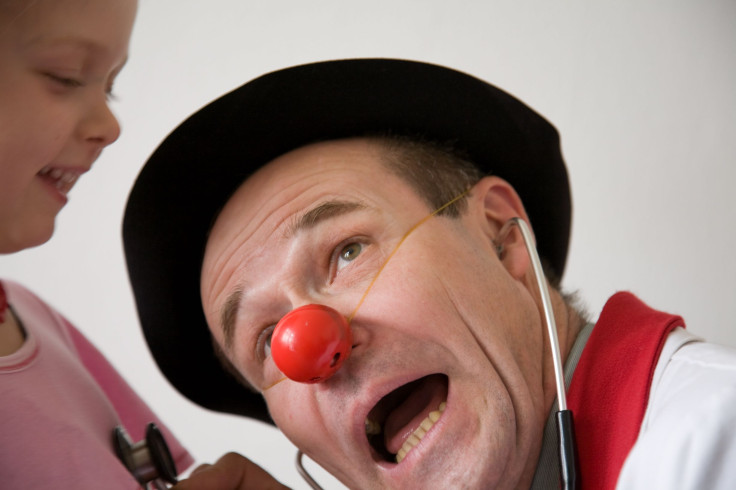Laughter Is the Best Medicine: Using Medical Clowns To Ease A Sick Child’s Pain

Undoubtedly, each of us has quoted the famous chestnut, “Laughter is the best medicine,” at one point or another. In truth it is one highly effective alternative therapy, according to a recent study conducted by researchers at Tel Aviv University. They found the presence of a “medical clown” significantly reduced anxiety and pain in children undergoing allergy tests.
Way back in 1964, Norman Cousins, author and former editor of Saturday Review, was diagnosed with a rare disease, Ankylosing spondylitis, and told by his doctor he could not expect to live beyond a year. “At the point when I discovered [my illness] was serious, I realized I had some responsibility and I had to get interested in this thing,” he states in an interview with James Day (see video below).
What he chose to do after extensive research of his disease would be considered unorthodox, to say the least. Cousins locked himself in a hotel room where he self-administered a customized recovery program. It included just two elements, taken in megadoses: vitamin C delivered through an IV, and laughter delivered via Marx brothers movies (projected on the wall). “I made the interesting discovery that 10 minutes of good belly-laughing would give me two hours of pain-free sleep. … Laughter did produce an actual body anesthesia,” he states in the Day interview.
Later, Cousins detailed his journey from illness to recovery in Anatomy of an Illness, and today he is considered by many a pioneer in the field of alternative medicine. This YouTube video, courtesy of C.J. Mason, offers you a glimpse of his thinking:
Children, Laughter, and Pain
In keeping with the work of Cousins, the Tel Aviv recent study enrolled nearly 100 children participants, who ranged in age between 2 and 17. As the basis of the experiment, a medical clown accompanied half the children to an allergy skin prick test, while the other half of children partipants attended the test as usual (with just their parents). Next, the researchers assessed each participant's pain using the Faces Pain Scale-Revised for the children under the age of 7 and using a visual analog scale for the children over the age of 8. Additionally, the researchers recorded their parent’s level of situational anxiety.
So what conclusions did the researchers draw? The presence of a clown tended to improve pain scores in the younger children (between 4 and 7 years old), though not the older children. Unusually, the clown's participation reduced situational anxiety in the parents of children older than 8. Needless to say, this study result in support of laughter as medicine does not stand alone.
A 2013 study from researchers in Hamburg looked into pediatric clowning, specifically documenting online evaluations from 87 hospital clowns, 37 parents, and 43 hospital staff. Their online survey showed the hospital clowns to be “well-trained, motivated, and generally satisfied with their work,” according to the authors, who also noted, “both parents and hospital staff stated that the patients as well as they themselves benefited from the intervention.” Ultimately, the researchers recommend its “routine use and expansion.”



























